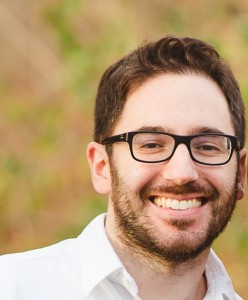Noah Cincinnati, Ph.D.
Position: Associate Professor of History, Northern Virginia Community College
Field: Higher Education
Thesis: “‘Health Here—Heaven Here!’: Eugenics and the Advocacy of Extermination in New York, 1900-1945.” Received Joseph C. Vance Award for Excellence in Historical Research.
Graduated: 2005
I was intent on majoring in history upon my arrival as a freshman in the early autumn of 2001. My decision to ultimately pursue a Ph.D. in the same field and become a professor of history was a direct result of my experiences as a history major at UMW. Two of our core practices in the historical profession—teaching and historical research—were both introduced to me in the department. First and foremost, I benefited from studying under dedicated professors. In particular, I found my intellectual curiosity sparked and challenged by Professors Jeffrey McClurken, Claudine Ferrell, Porter Blakemore, and William Crawley. Their mastery of their fields of expertise, the ways they constructed narratives, and their ability to push students to complicate their historical understandings were inspirational. As my years of study progressed, I found myself increasingly wanting to both replicate their teaching models while also crafting my own identity as an educator.
My turning point towards pursuing a Ph.D. in history was taking a course on the History of Gilded Age America with Professor Ferrell. My assumptions that few significant developments occurred in the United States from 1865 to 1900 were quickly destroyed. I found myself captivated by a period of history that witnessed tremendous social unrest, anxiety, violence, and economic and demographic transformations. It was in this course that I first encountered little-understood groups of intellectuals, scientists, and concerned elites who struggled to grasp modernity and attempted to cultivate a world insulated from the sweeping changes of industrial capitalism, urbanization, and global migration. I began asking questions about how these groups of anxious elites dealt with the changes wrought by modernity in the United States, and more broadly, the world. I pursued preliminary answers through my senior thesis on the eugenics movement during the turn of the twentieth century. One of the special opportunities in UMW’s history department is the conducting of original historical research. My undergraduate training taught me to seek out new archives, utilize original sources through unconventional methods, and construct narratives to produce new bodies of knowledge and reveal previously unknown stories. The answers I sought in my senior thesis only led to more questions about the broader American anxieties concerning the disappearance of wild species and wild places in the face of global capitalism, imperialism, and modernity at the dawn of the twentieth century.
I carried those questions with me to the Johns Hopkins University where I completed a dissertation on the early-twentieth-century birth of the international wildlife protection movement and its hidden relationships with global capitalism, imperialism, smuggling, and species extinction—a dissertation that really began in the classrooms of Monroe Hall years earlier. The skills I had learned at UMW became integral to my Ph.D. pursuit and continue to be critical to my career as a professor at Northern Virginia Community College. In my current capacity as a teacher and scholar of United States, environmental, and international histories, I hope to inspire and challenge the next generation of students as I was at UMW. In my second year I was nominated for the college-wide Faculty of the Year Award, a testament of my professors at UMW. Even now, I find myself continually reexamining those original questions I developed in Professor Ferrell’s class. Nearly ten years later, they continue to push me.

